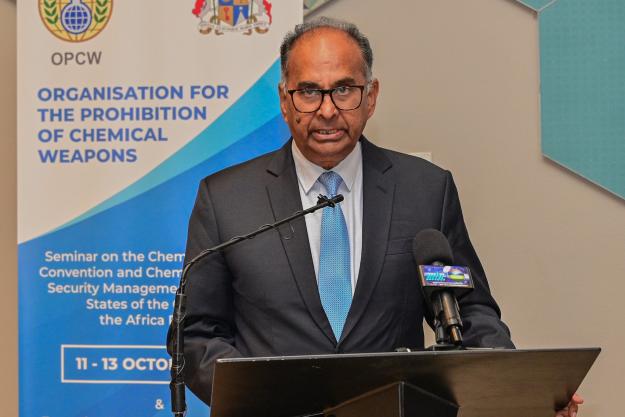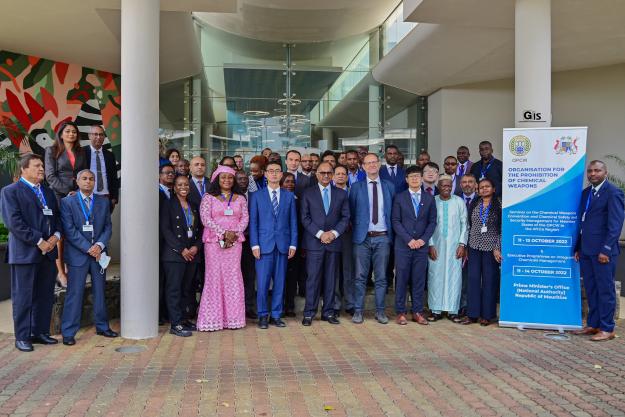The Organisation for the Prohibition of Chemical Weapons (OPCW) jointly with the Prime Minister's Office of the Republic of Mauritius conducted two training courses in Mauritius concurrently. One course focussed on chemical safety and security management for African Member States, held from 11 to 13 September, and an executive programme on integrated chemicals management, held 11 to 14 September, took place in Port Louis, Mauritius.
In his opening remarks, H.E. Mr Alan Ganoo, Minister of Foreign Affairs of the Republic of Mauritius, expressed the importance of international cooperation in the implementation of the Chemical Weapons Convention (CWC). He highlighted: "Capacity building, enhancement, awareness raising, and moving with the times are critically important strategies for the efficient implementation of the Chemical Weapons Convention".

The two courses were co-funded by the European Union (EU) and part of the EU Joint Action Programme. The seminar on chemical safety and security management for the African Member States is part of a series of integrated chemical management programmes on chemical safety and security for industry conducted by the OPCW's International Cooperation Branch (ICB). It was conducted as part of the Programme to Strengthen Cooperation with Africa (Africa Programme). The executive programme is an advanced course intended for senior managers from industry, government institutions, and policymakers. Both courses covered topics of dual-use chemicals, process safety management, occupational health and safety for industry, personal safety leadership, and gender mainstreaming in chemical safety and security management.
The two courses were attended by a total of 36 representatives from the following 20 OPCW Member States: Algeria, Argentina, Bangladesh, Botswana, Burundi, Chad, Democratic Republic of Congo, Costa Rica, Cóte d'lvoire, Djibouti, Guatemala, Guinea, Kenya, Malawi, Nicaragua, Nigeria, Pakistan, Mauritius, Sudan, and Zimbabwe.

Background
Article XI of the CWC, Economic and Technological Development, provides international cooperation for the economic and technological development of States Parties. Capacity building under Article XI incudes integrated chemicals management, laboratory capabilities enhancement, and promotion of chemical knowledge.
The Africa Programme focuses on the needs of OPCW Member States on that continent, including the promotion of uses of chemistry for peaceful and authorised purposes to support a developed, safe, and secure Africa.
As the implementing body for the Chemical Weapons Convention, the OPCW, with its 193 Member States, oversees the global endeavour to permanently eliminate chemical weapons. Since the Convention's entry into force in 1997, it is the most successful disarmament treaty eliminating an entire class of weapons of mass destruction.
Over 99% of all declared chemical weapon stockpiles have been destroyed under OPCW verification. For its extensive efforts in eliminating chemical weapons, the OPCW received the 2013 Nobel Peace Prize.






